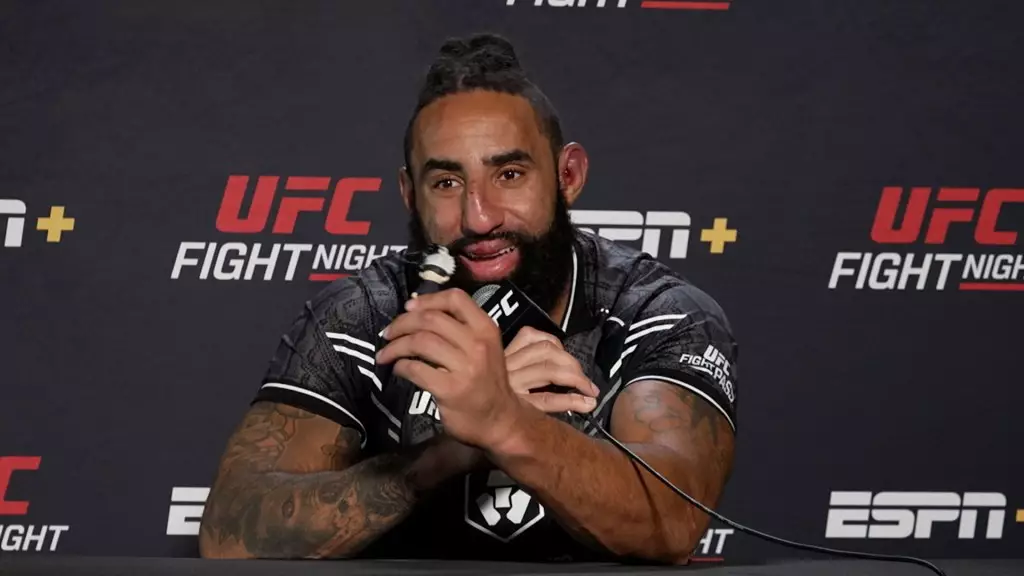In the electrifying atmosphere of the UFC Apex in Las Vegas, Austen Lane made a notable mark on his UFC career by defeating Robelis Despaigne with a unanimous decision during the preliminary card of UFC Fight Night 245. The judges scored the bout 29-28 in favor of Lane three times, highlighting a closely contested fight that showcased Lane’s evolving skill set and determination to secure his first win in the octagon. This win is pivotal not just for Lane’s record—which now stands at 13-5 overall, and 1-2 in the UFC—but also for his psychological outlook as he navigates the challenges of mixed martial arts.
Lane’s victory was not merely a stroke of luck, nor was it an accident. His performance was a calculated exhibition of mixed martial arts prowess, notably marked by his ability to secure three takedowns and maintain almost nine minutes of control time. This ability to dominate in grappling exchanges speaks volumes about his preparation and strategic insight going into the fight. Lane admitted that the journey to this win has been laden with obstacles, especially after facing setbacks in his earlier performances within the UFC. His experience highlights a common reality in competitive sports: that adaptation and resilience often lead to success.
Reflecting on his growth, Lane remarked, “I think I’ve found the right formula… and the right routine to put me in a flow state and get that win.” It’s a testament to the hard work and the mental fortitude needed in achieving victory in such a demanding sport. The seemingly elusive “right formula” he refers to suggests that success in MMA is as much about mental preparation and personal belief as it is about physical training and skills.
Beyond the numbers and statistics lies the emotional weight of this victory. For Lane, the presence of his son at the fight added an irreplaceable dimension to the experience. He expressed how essential the familial bond felt during his performance: “I needed him here. He’s always been my biggest support system.” This emotional grounding often serves as a pivotal motivator for athletes, and in Lane’s case, it appears to have provided the extra push he needed to perform under pressure.
Winning in front of family, especially a child, often motivates athletes to reach unprecedented heights. The psychological component of having that familial support—especially after previous loss—can be a game-changer. Lane’s acknowledgement of the challenges he faced in his past fights and his conviction to overcome them reinforce the idea that sports are a mental as much as a physical endeavor.
Lane’s approach to fighting embodies the concept that mixed martial arts is not merely a sport but a lifestyle. He stated, “I’m not meant to really sit around… I’m just the guy that’s always back in the gym, always pushing forward.” This relentless pursuit of improvement is crucial for athletes who wish to excel in a field where competition is ever-evolving. The admission that he thrives in an environment of consistent training and improvement sets him apart from those who may dabble without full commitment.
His philosophy of treating fighting as a dedicated lifestyle resonates with many athletes who aim for greatness. The mentality of always being in the gym, refining techniques, and working to better oneself mentally and physically often lays the foundation for long-term success in sports and professional fighting.
Following the victory over Despaigne, Lane’s sights are set not just on recovery and training, but on where this victory will place him within the heavyweight division. As he returned home to Jacksonville, he was adamant about continuing this winning momentum. Lane’s experience at UFC Fight Night 245 illustrates that while the path may be fraught with challenges, the drive to improve and adapt will be what ultimately defines his legacy in the sport. With his newfound confidence and support system behind him, the future looks promising for Austen Lane as he continues to carve out his place in the competitive landscape of the UFC.

